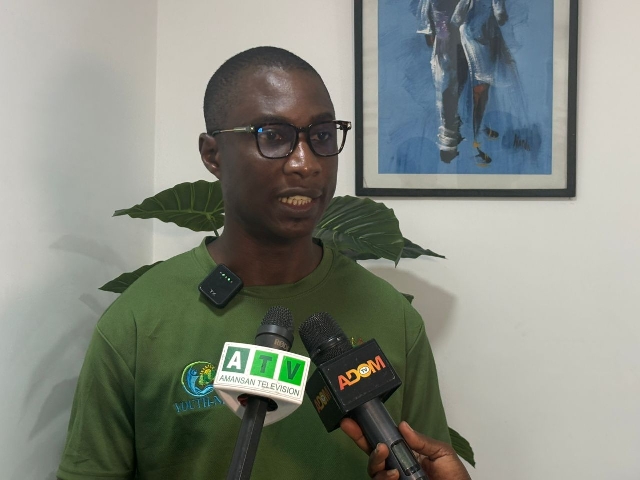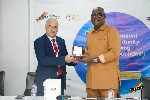SYND to gov't, Deepen youth engagement, increase green entrepreneurship, scale up energy sector investments
 Executive Director for SYND Ghana Chibeze Ezekiel
Executive Director for SYND Ghana Chibeze Ezekiel
The Strategic Youth Network for Development (SYND) has called on the government to deepen youth participation, increase funding for green entrepreneurship, and scale up investments in the energy sector as Ghana advances its Mission 300 commitments.
The Mission 300 Africa Energy Summit was a two-day event held in Dar es Salaam, Tanzania, on January 27-28, this year, to accelerate energy access for 300 million people by 2030.
Presenting its analysis on the 2026 Budget Statement and Economic Policy, at a news conference in Accra, Executive Coordinator of SYND, Chibeze Ezekiel, commended the government for recognising the National Energy Compact in the 2026 Budget Statement.
The group lauded its reaffirmation of key targets, including achieving 99.8 per cent electricity access, 50 per cent clean cooking access, and increasing renewable energy contribution to 10 per cent by 2030.
"Given that job creation is central to the Mission 300 programme, young people ought to be involved in the planning and implementation of the Energy Compact, in line with provisions of the National Youth Policy," he said.
Mission 300, under the National Energy Compact, represents a continental commitment to connect 300 million Africans to electricity by 2030. For Ghana, the initiative focuses on expanding electricity access, increasing renewable energy uptake, promoting clean cooking solutions, and catalysing investment within the energy sector. The programme is being led by the World Bank and the African Development Bank to accelerate energy access and economic transformation across Africa.
Mr Ezekiel welcomed several initiatives captured in the budget, including the rollout of the Rural Electricity Acceleration and Urban Intensification Initiative, which aims to connect all unserved communities using a faster Turnkey Model to drive rural development. He highlighted commitments to extend electricity to all remaining homes and businesses, scale up off-grid solar solutions in hard-to-reach regions such as Volta, Oti, Savannah, and Central, and implement Phase I of the National LPG Promotion Programme. This phase targets the distribution of 450,000 household cookstoves and 7,000 commercial units nationwide.
However, he expressed concern over the lack of clarity on expected job creation within the energy sector, despite Mission 300's strong emphasis on employment for young people.
He noted that although government projects the creation of 800,000 jobs in 2026, and anticipates 322,110 renewable energy jobs between 2026 and 2030, the budget did not specify how many would arise directly from Mission 300 interventions.
"The budget failed to touch on jobs in the energy sector, especially when Mission 300 largely bothers on employment opportunities for young people," he noted.
He also described as "inadequate" the GHS2.0 billion allocation for Phase I of the Rural Electricity Acceleration and Urban Intensification Initiative, which aims to expand electricity access to underserved rural communities and improve power supply in urban areas.
He explained that the Energy Compact required an investment of US$4.4 billion, with US$1.8 billion expected from public and donor sources.
"This means the GHS2.0 billion (approximately US$180 million) allocation for 2026, though commendable, is inadequate," he stated.
Additionally, he raised concerns over the limited support for youth-led clean energy businesses, such as solar enterprises and producers of clean cookstoves and briquettes, which he said played a critical role in advancing Mission 300 and creating both direct and indirect employment opportunities.
He warned that Phase I of the National LPG Promotion Programme may result in "stranded cylinders" due to inadequate LPG filling infrastructure and rising gas costs, which could hinder adoption despite the ambitious distribution targets.
Mr Ezekiel urged the government to recognise youth-led renewable energy enterprises as partners and co-creators of national energy solutions. He called for youth participation in the implementation of energy compact, consistent with the national youth policy.
Source: Classfmonline.com/Zita Okwang
Trending Business

GIPC CEO urges investors to capitalise on Ghana’s pro-business environment
01:40
TAGG attributes high prices of goods on the market to Customs taskforce bribery
14:31
Ghana generates US$9 billion in foreign exchange through ASM -Sammy Gyamfi reveals
12:52
S/R: PBC shea butter factory back up, contracts secured to supply Netherlands, others
12:16
We never valued Springfield’s asset at US$700 million- GNPC, Explorco reject allegations
06:37
Ghana welcomes rescission of Trump's 15% tariffs on cocoa, other agric products, and forecasts $60m in revenue boost
14:06
GUTA women's wing embarks on National Monitoring Tour to support traders
16:57
GTBank opens 38th branch in Ho, assures quality customer care and commitment to Volta Region’s economic growth
19:36
Blue Gold responds to Supreme Court ruling on Bogoso-Prestea mine case
08:22
President Mahama Appoints Kwame Griffiths as Deputy MD of Cocoa Processing Company
08:09



